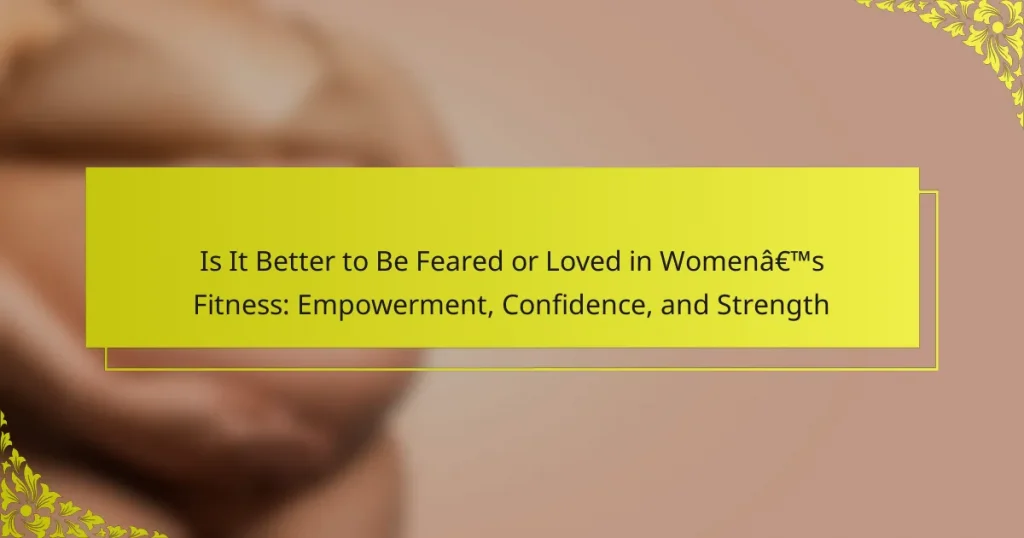In women’s fitness, the balance between being feared and loved poses a significant challenge for empowerment, confidence, and strength. This article explores how empowerment fosters self-esteem, the critical role of confidence over physical strength, and the unique challenges women face. It also examines the importance of supportive communities and best practices that enhance mental resilience. Ultimately, understanding these dynamics can lead to a more fulfilling fitness journey for women.

What Does Empowerment Mean in Women’s Fitness?
Empowerment in women’s fitness means fostering confidence and strength through supportive environments. It encourages women to embrace their physical capabilities and pursue their fitness goals without fear of judgment. Empowerment enhances self-esteem, promotes resilience, and cultivates a sense of community among women. This unique attribute of empowerment directly influences overall mental and physical well-being, leading to sustained participation in fitness activities.
How Can Empowerment Enhance Confidence?
Empowerment significantly enhances confidence by fostering a sense of control and self-worth. When women engage in fitness empowerment, they build resilience and a positive self-image. This transformation leads to increased motivation and commitment to fitness goals. As a result, empowered individuals often experience improved mental health, which further boosts their confidence in various life aspects.
What Role Does Community Play in Empowerment?
Community plays a vital role in empowerment by fostering support, motivation, and shared experiences. In women’s fitness, a strong community enhances confidence and encourages strength development, creating an environment where individuals feel valued and inspired. This collective engagement leads to increased participation and perseverance in fitness journeys. Additionally, the sense of belonging within a community can significantly boost mental resilience, making challenges more manageable. Empowerment through community not only promotes individual growth but also strengthens the overall fitness culture.
How to Build a Supportive Network?
Building a supportive network in women’s fitness involves fostering connections that empower and inspire. Start by engaging with like-minded individuals who share similar fitness goals. Attend classes, workshops, or community events to meet potential allies. Leverage social media platforms to connect with fitness groups or influencers who promote empowerment and confidence.
Consider joining local fitness clubs or online forums focused on women’s strength training. These platforms facilitate sharing experiences, tips, and motivation. Establishing accountability partners can enhance your commitment and boost morale. Lastly, prioritize nurturing these relationships by offering support and encouragement in return, creating a reciprocal environment that benefits all members.
What Are Effective Empowerment Programs?
Effective empowerment programs in women’s fitness foster confidence and strength through supportive environments. These programs emphasize personal growth, community engagement, and skill development. For example, mentorship opportunities can enhance self-esteem, while group classes promote social connections. The unique attribute of these programs is their focus on holistic empowerment, addressing mental and physical aspects. As a result, participants often report improved body image and motivation.

Is Confidence More Important Than Strength?
Confidence is more important than strength in women’s fitness. While strength contributes to physical capabilities, confidence empowers women to push boundaries and embrace challenges. A study found that women who exhibit confidence are more likely to engage in fitness activities and achieve their goals. Confidence fosters a positive mindset, encouraging perseverance and resilience. In contrast, strength alone may not drive motivation or long-term commitment. Thus, prioritising confidence can lead to greater empowerment and overall success in fitness journeys.
How Does Confidence Impact Performance?
Confidence significantly enhances performance in women’s fitness by boosting motivation and resilience. When women feel empowered, they are more likely to take on challenges and push their limits. Research shows that confidence can lead to improved physical outcomes, such as increased strength and endurance. Additionally, a confident mindset fosters a supportive community, encouraging others to pursue their fitness goals. This cycle of empowerment creates a positive feedback loop, reinforcing the benefits of confidence in achieving overall fitness success.
What Are the Psychological Benefits of Confidence?
Confidence significantly enhances psychological well-being in women’s fitness. It fosters resilience, reduces anxiety, and promotes a positive self-image. Empowered individuals often experience improved motivation and goal achievement. As a result, confidence becomes a unique attribute that drives personal growth and strength in fitness journeys.

What Are the Unique Challenges Women Face in Fitness?
Women in fitness face unique challenges that impact empowerment, confidence, and strength. Societal expectations often pressure women to conform to specific body ideals, which can undermine self-esteem. Additionally, women may encounter a lack of representation in fitness leadership roles, affecting their sense of belonging. Supportive communities that prioritise empowerment can help women overcome these obstacles. Emphasising strength and resilience fosters a more inclusive environment, encouraging women to embrace their fitness journeys.
How Do Societal Expectations Affect Women’s Fitness?
Societal expectations often pressure women to conform to specific fitness ideals, impacting their empowerment and confidence. These expectations can lead to a focus on appearance over strength, diminishing the value of personal achievements in fitness. As a result, women may struggle to embrace their unique fitness journeys, often prioritising societal approval over self-acceptance. This dynamic can hinder their overall strength and well-being. Encouraging a shift towards celebrating individual progress and redefining success in fitness can empower women to break free from these restrictive norms.
What Are Common Misconceptions About Women’s Strength?
Many misconceptions exist about women’s strength in fitness. One common belief is that women should avoid lifting heavy weights to prevent becoming bulky. In reality, strength training enhances muscle tone and boosts metabolism without significant bulk. Another misconception is that women are inherently weaker than men. While physiological differences exist, women can achieve remarkable strength through training. Additionally, some think that strength training is only for competitive athletes. In truth, it benefits all women by improving overall health, confidence, and empowerment. Lastly, the idea that women should focus solely on cardio for weight loss is misleading; strength training is equally vital for effective fat loss and body composition.

How Can Women Balance Being Feared and Loved in Fitness?
To balance being feared and loved in women’s fitness, empowerment is essential. Women can cultivate strength and confidence through supportive environments that encourage personal growth. Emphasising community and shared goals fosters love, while showcasing determination and discipline can evoke respect. This duality enhances overall well-being and performance.
What Are the Benefits of Being Feared in a Fitness Context?
Being feared in a fitness context can enhance motivation and drive among peers. It fosters respect, encouraging others to push their limits. Fear can create a strong presence, leading to increased accountability and commitment in group settings. As a result, individuals may experience heightened confidence, empowerment, and overall strength in their fitness journey.
How Can Being Loved Drive Motivation?
Being loved significantly enhances motivation in women’s fitness by fostering empowerment and confidence. Emotional support creates a positive environment, encouraging women to pursue their fitness goals. Studies show that women who feel loved and supported are more likely to engage consistently in fitness activities, leading to increased strength and overall well-being. This connection between love and motivation highlights the unique attribute of emotional resilience in achieving fitness success.

What Are Rare Attributes of Empowerment in Women’s Fitness?
Empowerment in women’s fitness includes rare attributes such as resilience, individuality, and community support. Resilience enables women to overcome challenges, fostering a mindset that embraces growth. Individuality celebrates unique fitness journeys, allowing personal expression in routines. Community support creates a network that reinforces motivation and accountability, enhancing overall empowerment. These attributes collectively contribute to a transformative fitness experience.
How Do Personal Stories Influence Others’ Empowerment?
Personal stories significantly enhance others’ empowerment in women’s fitness by fostering connection and relatability. Sharing experiences builds a supportive community, encouraging women to embrace their strength and confidence. For example, narratives of overcoming challenges inspire resilience and motivate action. Empowerment thrives when individuals see their struggles reflected in others, reinforcing the belief that transformation is achievable.
What Role Does Media Representation Play?
Media representation plays a crucial role in shaping perceptions of women’s fitness, impacting empowerment, confidence, and strength. Positive portrayals encourage women to embrace their fitness journeys, promoting a culture of acceptance and resilience. Studies show that diverse media representation leads to increased self-esteem among women, reinforcing the idea that strength comes in various forms. This representation challenges stereotypes, enabling women to feel both empowered and loved within fitness communities.

What Best Practices Can Women Apply for Lasting Empowerment?
Empowerment in women’s fitness is best achieved through self-love and confidence. Women can apply best practices such as setting realistic goals, embracing body positivity, and fostering supportive communities. These practices enhance mental strength and resilience, leading to lasting empowerment. Engaging in regular physical activity boosts confidence and promotes a positive self-image. Additionally, women should prioritise education about fitness and nutrition to make informed choices, further reinforcing their empowerment journey.
How to Set Realistic Goals for Personal Growth?
Setting realistic goals for personal growth in women’s fitness focuses on empowerment, confidence, and strength. Start by defining specific, measurable, achievable, relevant, and time-bound (SMART) objectives. For instance, aim to increase workout frequency to three times a week within a month.
Track progress regularly to maintain motivation and adjust goals as necessary. Celebrate small victories to build confidence, reinforcing the empowerment aspect. Additionally, connect with a supportive community to enhance accountability and share experiences.
Incorporate unique attributes such as personal values and fitness interests to ensure goals resonate deeply. This personalised approach fosters a stronger commitment to personal growth.
What Mistakes Should Be Avoided in Pursuing Empowerment?
To pursue empowerment effectively, avoid common mistakes that undermine confidence and strength. Focusing solely on external validation can weaken intrinsic motivation. Neglecting self-care leads to burnout, hindering progress. Comparing yourself to others creates unrealistic standards and diminishes self-worth. Ignoring the importance of community support can result in isolation, reducing resilience. Lastly, underestimating the power of mindset limits growth potential.
How to Sustain Motivation in Women’s Fitness?
To sustain motivation in women’s fitness, focus on empowerment, confidence, and strength. Setting achievable goals fosters a sense of accomplishment. Engaging in community support enhances motivation through shared experiences. Tracking progress visually can boost confidence and maintain commitment. Celebrating milestones reinforces positive behaviours and encourages continued effort.




